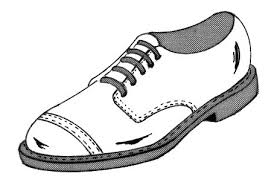记忆方法
shoe..............鞋..............鞋
中文词源
shoe 鞋,穿鞋
来自古英语 scoh,鞋,来自 Proto-Germanic*skokhaz,鞋,来自 PIE*skeu,覆盖,隐藏,词源同 hide,hose,shun.
英语词源
- shoe
-
shoe: [OE] Shoe is a strictly Germanic word, with no living relatives in other branches of the Indo- European language family. It comes from a prehistoric Germanic *skōkhaz, which is probably descended ultimately from the Indo- European base *skeu- ‘cover’. Its cousins are German schuh, Dutch schoen, and Swedish and Danish sko. Until the early modern English period shoon vied with shoes as its plural; and the archaic past form of the verb, shod, still survives.
=> shod - shoe (n.)
- Old English scoh "shoe," from Proto-Germanic *skokhaz (cognates: Old Norse skor, Danish and Swedish sko, Old Frisian skoch, Old Saxon skoh, Middle Dutch scoe, Dutch schoen, Old High German scuoh, German Schuh, Gothic skoh). No known cognates outside Germanic, unless it somehow is connected with PIE root *skeu- "cover" (cognates: second element in Latin ob-scurus).
Old plural form shoon lasted until 16c. Meaning "metal plate to protect a horse's hoof" is attested from late 14c. Distinction between shoe and boot (n.) is attested from c. 1400. To stand in someone's shoes "see things from his or her point of view" is attested from 1767. Old shoe as a type of something worthless is attested from late 14c.
Shoes tied to the fender of a newlywed couple's car preserves the old custom (mentioned from 1540s) of throwing an old shoe at or after someone to wish them luck. Perhaps the association is with dirtiness, on the "muck is luck" theory. - shoe (v.)
- Old English scogan "to shoe," from the root of shoe (n.). In reference to horses from c. 1200. Related: Shoed; shoeing.
权威例句
- 1. A long vowel is a long sound as in the word'shoe ".
- 长元音即如“shoe ” 一词中的长音.
- 2. His shoe had rucked up one corner of the pale rug.
- 他的鞋子把浅色地毯的一角弄皱了。
- 3. This shows where the foot and shoe are in contact.
- 这显示了脚和鞋接触的地方。
- 4. Nancy was lacing her shoe up when the doorbell rang.
- 门铃响时南希正在系鞋带。
- 5. A long vowel is a long sound as in the word "shoe".
- 长元音即如“shoe”一词中的长音。

